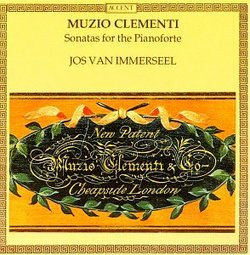| All Artists: Muzio Clementi, Jos van Immerseel Title: Clementi: Piano Sonatas Members Wishing: 1 Total Copies: 0 Label: Accent Plus Original Release Date: 1/1/2008 Re-Release Date: 1/1/1999 Album Type: Import Genre: Classical Styles: Chamber Music, Forms & Genres, Sonatas, Historical Periods, Classical (c.1770-1830) Number of Discs: 1 SwapaCD Credits: 1 UPCs: 182478051620, 750582472220 |
Search - Muzio Clementi, Jos van Immerseel :: Clementi: Piano Sonatas
 | Muzio Clementi, Jos van Immerseel Clementi: Piano Sonatas Genre: Classical
|
Larger Image |
CD Details |
CD ReviewsEarly Immerseel Jonathan J. Casey | the twin cities | 01/05/2001 (4 out of 5 stars) "This CD was recorded in 1979, but don't let that scare you off; there's none of the roughness of some older period-instrument recordings to be found here. The Rosenberger fortepiano c.1795 from the Finchcocks Collection sounds very sharp and clear, and Immerseel's performance is sparkling throughout. Clementi's sonatas are rooted in Haydn's while building a bridge toward Beethoven, Schubert, and even Chopin. They are less virtuosic, to be sure, and less ponderous (the longest clocks in around 14 minutes), but no less appealing or satisfying. It took a few listens before I started to really appreciate it, but this is excellent late-Classical piano music, and if you're looking for a good recording of Clementi: this is the one." The Inspiration for the Magic Flute Brian J Hay | Sarnia, Ontario Canada | 06/13/2005 (5 out of 5 stars) "The first thing that's heard when this disc is played are strains from "The Magic Flute". The first musical phrase is virtually identical to the central theme from the Overture from the work. The second phrase varies noticeably but the resemblance is still obvious. From there phrases from the famous piece by Mozart are more vague but still pronounced enough to be noticeable. This is especially true of both the allegro con brio that opens the piece and the rondo, allegro assai that closes it. Only, Mozart didn't write this. Muzio Clementi did. It's his Opus 24 Sonata in B-Flat Major and it predates Zauberflöte by several years.
Mozart voiced a low opinion of Clementi and his work but he obviously liked it more than he was willing to admit. The resemblance between the two pieces of music isn't just a strong similarity-it's outright plagiarism. Clementi caught it and resented it. If it happened in this era the case would be in court. And Mozart would be sharing his royalties. This isn't meant to Demean Mozart or his work. His music flows with the ease of an unobstructed breeze and his use of melody is often astoundingly beautiful. But, like anyone else he had influences and he drew from them freely. Clementi was one of those influences and it shows, not just in in the B-Flat Sonata but in much of what Mozart wrote for the piano. To be fair ideas Mozart had and the structure in his writing is apparent in much of Clementi's work. They look to have influenced each other to the point where an astute judge might have ended things by suggesting they become business partners. Clementi's influence doesn't end there though. The language of his keyboard writing and willingness to break from established forms herald the work of Beethoven and many of the great romantic composers. His musical language is evident in the work of Chopin, Liszt and even the G-Minor Piano Concerto written by Dvorak. Parts of all the Sonatas on this disc, the Opus 25 (Number 5 in F-Sharp Minor), Opus 37 (Number 2 in G-Major) and Opus 13 (Number 6 in F-Minor) sound as if they could have been written at any time in the nineteenth century. The performances by pianist Jos van Immerseel are inspired. He has a light touch that downplays some of the tempestuous nature of Clementi's music in favour of its poetic qualities. He explores the variety of ideas in each Sonata well but never loses touch with their central themes. Because of that musical ideas flow easily from one to another even through the abrupt stops and starts found in the pieces. The extended passages (especially in the Presto from the Opus 13 Sonata) flow like waves from his fingertips. Jonathan Casey remarked the age of this recording shouldn't be a deterrent and he's absolutely right. The recorded sound is crisp and clear and captures colourful the tonal range of the Derek Adam copy of a five octave Rosenberger fortepiano very well. The recorded sound is virtually identical to the sound on an excellent and (much) more recent recording released by Naxos that (probably) used the same instrument. This should be a "must have" for lovers of modern piano. It definitely shows much of the path to the maturity of the instrument and much of the music that's been written for it. As well, it's just really enjoyable to listen to." |

 Track Listings (12) - Disc #1
Track Listings (12) - Disc #1